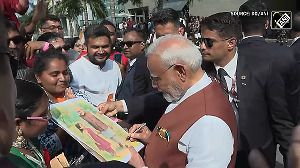 World Trade Organization chief Pascal Lamy is going to the G-20 meeting at Pittsburgh with a clear message that the failure to reach the Doha trade deal would be 'hard felt' by the global economy facing the worst crisis since 1930s.
World Trade Organization chief Pascal Lamy is going to the G-20 meeting at Pittsburgh with a clear message that the failure to reach the Doha trade deal would be 'hard felt' by the global economy facing the worst crisis since 1930s.
"I will tell them. . .leadership is about responsibility. Failure to act -- not just in Pittsburgh but also in Geneva will be hard felt by the entire international community at this time of economic crisis," Lamy told the trade negotiating committee of WTO, ahead of the meeting of the leaders of the world's rich and emerging countries beginning on Thursday in the US.
The G-20 leaders at their last meeting at London had asked Lamy to explore ways to improve the political engagements for resolving differences on the much-delayed Doha Round of negotiations, which were meant to culminate into a multilateral trade liberalising agreement in 2005.
Lamy said following the New Delhi meeting of about 35 trade ministers early this month, negotiators in Geneva have worked out a plan for further talks which require backing of political leaders.
"I will tell them, in a nutshell, that we in Geneva (WTO headquarters) have done what they asked us to do. They have the road mapped out, but they still have to walk it," he said.
Protectionism in times of economic trouble would be one of the key issues at the meeting of the G-20 leaders, including Prime Minister Manmohan Singh and US President Barack Obama.
About the prospects of the Doha talks conclusion, a cautious Lamy said, "it would be premature for me to predict today. . .We should be in a position to judge by December whether or not this has happened."
"It depends on your engagement at all levels, multi-laterally, plurilaterally and bilaterally, starting now," he said.
Trade talks resumed in WTO headquarters at Geneva from September 14 aimed at reaching a global pact for opening $32 trillion international commerce.
At Geneva in July 2008, the ministers had failed to reach a consensus as India remained steadfast on protecting its farmers and the US seeking higher market access for its agri products in advanced developing countries like India.
Image: Pascal Lamy









